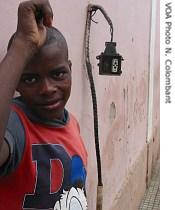2007年VOA标准英语-UN Calls for Stop to Trafficking of Children in(在线收听)
By Lisa Schlein
Geneva
16 June 2007
United Nations and international aid agencies are calling for a stop to the trafficking of children in Africa. As the world marks the Day of the African Child, the agencies condemn a practice that exploits and enslaves children in Africa and elsewhere. Lisa Schlein reports for VOA from Geneva.
 |
| African boys like this one may be abducted and used as child soldiers and laborers |
In Africa, the recruitment of children as soldiers by governments and rebel groups occurs largely in the Great Lakes region of Central Africa, in West Africa, in Uganda and Sudan.
Richard Danziger heads the counter-trafficking division of the International Organization for Migration. He says child soldiers are subject to the most appalling form of abuse and exploitation.
"Children as young as five, six years old - not necessarily all fighting. They may be put to work cooking for soldiers. Girls being raped. I guess you would call them sex slaves. Children being forced to commit atrocities and so forth. And, then if you look at the more sort of servitude type of slavery… If they are fishing for example, one of the things they do - because they have little fingers - is dive into the lake and try to untangle the nets and there are often accidents in this sort of work," he explained.
Danziger says the children usually are forced to sleep on the floor and to work 12 to 16 hours a day. In return, all they get is some food.
He says another major form of child trafficking in Africa is the corruption of a traditional practice. Formerly poor families would send their children to live with better off relatives or friends. In exchange for learning a trade and getting an education, children would help around the house.
But, Danziger says this system has broken down because of changing social and economic structures. Now, he says children often are employed in slave-like conditions. They get no education and have to work long hours for food.
"One example of this is in Ghana, where children get sent off to help fishermen on Lake Volta," he added. "And we have a very good program in place with the government of Ghana that is trying to give alternative employment to the fishermen - because they are over-fishing the lake - income generation to the parents, and then putting the kids in school."
Last July, African countries pledged to try to end child trafficking. Since then, Chad and Togo have incorporated a plan of action against child trafficking into their child protection plans. Ivory Coast, Gabon and Congo have also taken steps to combat this scourge.